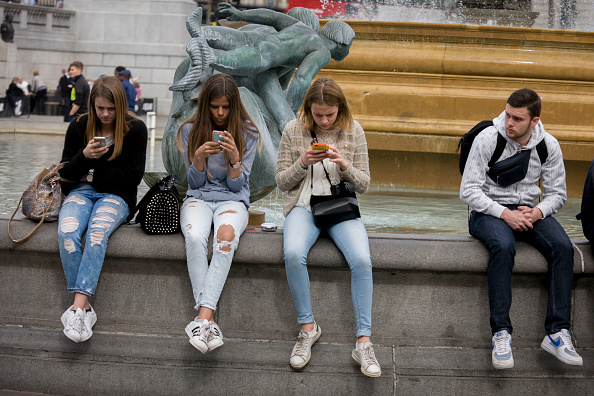

'The Anxious Generation' Details How Social Media Screwed Up an Entire Generation of Kids
By Dustin Rowles | Social Media | April 30, 2024 |
By Dustin Rowles | Social Media | April 30, 2024 |

Jonathan Haidt, a social psychologist and professor at New York University, recently published The Anxious Generation: How the Great Rewiring of Childhood Is Causing an Epidemic of Mental Illness. The book’s central argument is simple: Smartphones are detrimental to children’s mental health. As someone who initially hesitated to read the book due to its seemingly obvious premise (Smartphones are bad for kids? No shit!), I was surprised by the wealth of evidence Haidt presents to illustrate the extent of the damage caused by smartphones over the past decade.
One particularly striking study mentioned in the book involves mice and their response to dopamine hits. When a mouse completes a specific task and receives a dopamine hit, and then that hit is taken away, the mouse doesn’t simply give up and move on. Instead, it tries even harder and more aggressively to replicate that dopamine hit, over and over and over. This behavior is not unlike what happens when humans, especially children and teens with developing brains, become addicted to social media.
The Anxious Generation places particular emphasis on the dangers of social media for teenage girls, who can quickly become addicted to the likes, retweets, and positive feedback these platforms provide. As a result, they become wired to aggressively crave this validation, leading to a range of mental health issues such as eating disorders, depression, anxiety, and self-harm. Haidt recommends that teen girls avoid Instagram, Snapchat, and TikTok until they are at least 16 years old.
However, the dangers of smartphone addiction extend beyond just teenage girls. Smartphones can isolate children, hindering their ability to engage in normal social interactions. This isolation can lead to social awkwardness, as evidenced by the growing number of teenagers who struggle to interact with adults in everyday situations like ordering food at a restaurant. You’d also be surprised at how many teenagers don’t know how to order a sandwich at Subway.
Moreover, smartphones are turning Gen Z into a timid, socially reluctant, and risk-averse generation. Unlike previous generations who spent hours outside engaging in risky (but not necessarily life-threatening) behaviors, Gen Z is more likely to hide behind their phones. This shift has resulted in a generation that is less likely to take risks. Teens are having much less sex now, for instance, which is not necessarily a bad thing. But they’re also making fewer friends and engaging less often with the world around them.
As a parent, I’ve witnessed the impact of smartphones and social media firsthand. When my son was in the hospital, we allowed him to have social media as a distraction — what parent wouldn’t relent in that situation — but he quickly got addicted to the endless scroll. It took effort to break him out of the habit once he returned to school. In contrast, my twins do not have social media and are more socially active, engaged, and present (except when they’re watching Superstore), using their phones primarily for communication with friends (Haidt also concedes that using Facetime is the next best thing to in-person interactions). For the twins, social media is out of the question.
“But Declan got it!”
“We messed up,” we say. “We won’t do it again.”
While Haidt offers suggestions for schools, parents, and legislators to curb teenage phone use, implementing them requires collective action, and I seriously doubt that people who can’t agree on who won the 2020 election will come together to take that action. Social media networks should make it more difficult for underage users to create accounts, and parents should try to delay their kids’ introduction to social media until high school. It’s a pipe dream.
That said, if you’re a parent of a teen or preteen grappling with the decision of whether to allow social media, I highly recommend listening to chapters 9 and 10 of The Anxious Generation. Better yet, listen to these chapters with your teen to help them understand the risks so that they don’t think you’re being an arbitrary asshole since all their friends have social media. With a Spotify account, you can access 15 hours of free audiobook listening each month, which is more than enough time to cover the chapters.
More Like This
Reddit Asks the Question: 'What Free Software is So Good You Can't Believe It's Actually Free?'
Reddit Asks the Question: 'What Are Some Movie Lines That Make You Cringe?'
Aaron Rodgers Claims Dr. Anthony Fauci Engineered the AIDs Epidemic
If 'Absolutely Bloody Not' Could Be Summarised By a GIF
NPR Editor Uri Berliner Quits After Backlash to His 'Free Press' Article

Does Jerry Seinfeld Watch TV?
Conan O'Brien Says His Friends Thought He Was 'Dead'
Russell Brand Found Jesus, Everybody
Meryl Streep Says Nicole Kidman Skinny-Dipped Every Morning While Filming 'Big Little Lies'
Analytics Killed A New Show From David Cross And Bob Odenkirk
Brandi Glanville Says She’s Been ‘Hung Out to Dry’ by Bravo
More Like This
Reddit Asks the Question: 'What Free Software is So Good You Can't Believe It's Actually Free?'
Reddit Asks the Question: 'What Are Some Movie Lines That Make You Cringe?'
Aaron Rodgers Claims Dr. Anthony Fauci Engineered the AIDs Epidemic
If 'Absolutely Bloody Not' Could Be Summarised By a GIF
NPR Editor Uri Berliner Quits After Backlash to His 'Free Press' Article
Reviews